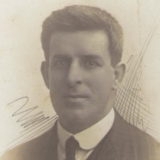SOLOMON, Harry Octavius
| Service Number: | 321 |
|---|---|
| Enlisted: | 24 September 1914, Rosehill, New South Wales, Australia |
| Last Rank: | Private |
| Last Unit: | 13th Infantry Battalion |
| Born: | Sydney, Colony of New South Wales (now Sydney, New South Wales, Australia), 10 December 1881 |
| Home Town: | Sydney, City of Sydney, New South Wales |
| Schooling: | Not yet discovered |
| Occupation: | Commercial Traveller (at enlistment) |
| Died: | Wentworth Falls, New South Wales, Australia, 14 August 1960, aged 78 years, cause of death not yet discovered |
| Cemetery: |
Rookwood Cemeteries & Crematorium, New South Wales |
| Memorials: |
World War 1 Service
| 24 Sep 1914: | Enlisted AIF WW1, Private, 321, 13th Infantry Battalion, Rosehill, New South Wales, Australia | |
|---|---|---|
| 22 Dec 1914: | Involvement Private, 321, 13th Infantry Battalion, --- :embarkation_roll: roll_number: '11' embarkation_place: Melbourne embarkation_ship: HMAT Ulysses embarkation_ship_number: A38 public_note: '' | |
| 22 Dec 1914: | Embarked Private, 321, 13th Infantry Battalion, HMAT Ulysses, Melbourne | |
| 2 May 1915: | Wounded AIF WW1, Private, 321, 13th Infantry Battalion, ANZAC / Gallipoli, During the morning of Sunday, 2 May 1915, the 13th Infantry Battalion advanced and took up position on Dead Man's Ridge, Quinn's Post Area, Gallipoli. Private Solomon was wounded above his left eye during this engagement. | |
| 3 Jul 1915: | Embarked AIF WW1, Private, 321, 13th Infantry Battalion, Suez, Egypt, onboard HS Ballarat. Disembarked Melbourne, 6 August 2015 | |
| 18 Jan 1916: | Discharged AIF WW1, Private, 321, 13th Infantry Battalion, 2nd Military District (New South Wales) |
Private Henry O. Solomon writes from the First Australian General Hospital, Heliopolis, Egypt, 1915.
"I suppose you have heard long before this that we have been in action and that the Australian and New Zealand did so well but at a great cost. I am a poor hand describing things at any time let alone this affair but I can assure you that hell cannot be worse [than] when the 13th Battalion landed there on Monday morning April 26 and after a few hours rest we went right into the thick of it.
I was in the trenches for about two hours and was then relieved feeling very sick having seen some of my mates killed and wounded. I did not go back to the trenches that day but after a fair night's rest I felt very [...] and went into the trenches again. After about an hour's firing we charged the enemy. My Sergeant had his hand shattered and I was hit over the left eye by a bullet. Two of my mates pulled me back to the trenches and to make a long story short, I, with about nine hundred others were taken back to Egypt which I did not think I would see soon.
On Friday May 7, they operated on me and took some small fragments from the wound but could not get at the bullet. Two of the doctors told me that they probed about two or three inches in but could not locate the bullet but as it would do me no harm, they would not trouble any more. I doubted them very much about the bullet being in my head but they assured me it was still in my head. I feel no ill effects from it so am not going to worry. I suppose I am one of the luckiest chaps in the hospital as several of the soldiers have lost one of their eyes. In fact two alongside me are each getting one eye out today, as the sight has been destroyed. So you see how fortunate I am."
Transcribed from:
Solomon, Harry O. “Bullet Has to Stop.” Evening News (Sydney, NSW), 9 Aug. 1915.
Submitted 13 April 2019 by Sasha Todhunter










